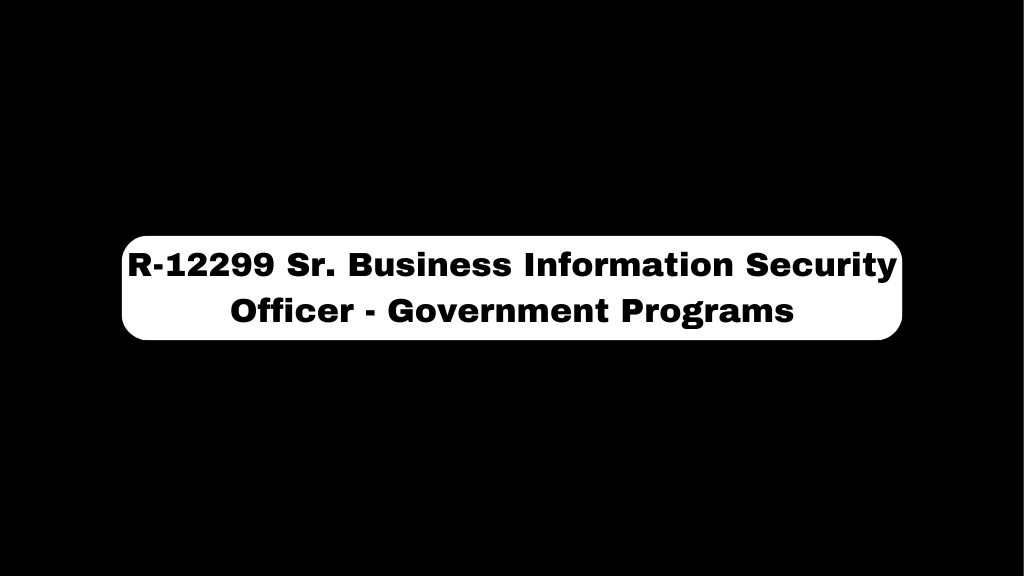In the modern landscape of cybersecurity, where digital threats loom large over national security and public welfare, the role of the R-12299 Sr. Business Information Security Officer (BISO) in government programs is increasingly significant. Tasked with the critical mission of securing sensitive data, these officers play a vital role in safeguarding the interests of government entities against the burgeoning threat of cyber attacks.
R-12299 Sr. Business Information Security Officer – Government Programs: Key Responsibilities of the R-12299 Sr. BISO
The R-12299 Sr. BISO’s responsibilities are expansive and pivotal to the integrity and security of government operations. Their core duties include:
- Data Protection: Implementing robust security measures to protect sensitive information from unauthorized access and breaches.
- Risk Management: Conducting thorough risk assessments to identify vulnerabilities within systems and proposing measures to mitigate these risks.
- Regulatory Compliance: Ensuring all security practices align with government regulations and standards, such as FISMA (Federal Information Security Management Act), HIPAA (Health Insurance Portability and Accountability Act), and others.
- Incident Response: Leading the response to security breaches or incidents, minimizing damage and coordinating with relevant stakeholders to prevent future threats.
- Security Training and Awareness: Developing training programs to enhance the security knowledge of government employees, making them aware of potential cyber threats and the best practices to mitigate these risks.
R-12299 Sr. Business Information Security Officer – Government Programs: Essential Skills for Success
To excel in this challenging role, an R-12299 Sr. BISO must possess a combination of technical proficiency and strategic acumen. Essential skills include:
- Technical Expertise: Deep understanding of network architectures, encryption technologies, and cybersecurity frameworks.
- Strategic Thinking: Ability to devise comprehensive security strategies that align with the organization’s goals and risk tolerance.
- Analytical Abilities: Strong skills in analyzing security data and trends to predict potential threats before they manifest.
- Communication: Effective communication skills are crucial for briefing senior officials and training staff on security protocols.
- Leadership: Leadership skills to guide and motivate a team of security professionals in a high-stakes environment.
R-12299 Sr. Business Information Security Officer – Government Programs: Challenges Faced in the Role
The path of an R-12299 Sr. BISO is fraught with challenges:
- Evolving Threats: As cyber threats evolve rapidly, staying ahead of the latest methods and technologies used by cybercriminals is a constant challenge.
- Resource Allocation: Balancing the cybersecurity budget and resources effectively, especially when facing governmental fiscal constraints.
- Interdepartmental Coordination: Coordinating security measures across different departments within a government entity can be complex and requires exceptional organizational skills.
R-12299 Sr. Business Information Security Officer – Government Programs: Career Path and Qualifications
Typically, a career as an R-12299 Sr. BISO in government programs begins with a foundational background in information technology or cybersecurity. Prospective officers often gain experience through roles such as network administrator, security analyst, or cybersecurity consultant. Advanced qualifications might include certifications like CISSP (Certified Information Systems Security Professional) or CISM (Certified Information Security Manager), which significantly bolster the expertise necessary for this role.
Looking to the Future
The future of the R-12299 Sr. BISO role is expected to involve:
- AI and Machine Learning: Leveraging AI technologies to predict and combat cyber threats more effectively.
- Increasing Interconnectivity: Addressing security challenges that come with the increasing interconnectivity of government systems.
- Regulatory Changes: Adapting to new laws and regulations that impact cybersecurity strategies and measures.
Navigating the Digital Frontier: Advanced Technologies in Play
Furthermore, as government programs increasingly integrate advanced digital solutions, the R-12299 Sr. BISO must stay abreast of emerging technologies that could impact security frameworks. Moreover this includes the adoption of blockchain for secure transaction processing and data integrity, quantum computing which could potentially break traditional encryption methods, and the Internet of Things (IoT), which expands the attack surface with its myriad connected devices. Navigating this digital frontier requires not only an understanding of these technologies but also a proactive approach to incorporating their security implications into strategic planning.
Public-Private Partnerships: Enhancing Cyber Resilience
The complexity of cybersecurity threats often necessitates collaboration beyond the confines of government offices. Consequently, the R-12299 Sr. BISO is pivotal in forging partnerships with private sector experts to enhance the government’s cybersecurity measures. These partnerships can facilitate the sharing of critical threat intelligence, co-development of security tools, and the mutual strengthening of cyber defense strategies. By leveraging external expertise and cutting-edge technology from the private sector, government programs can enhance their resilience against cyber threats.
Ethical Considerations and Data Privacy
In an era where data privacy has become a paramount concern among the public, the R-12299 Sr. BISO faces the dual challenge of enhancing security measures while also upholding stringent data privacy standards. This role involves ensuring that all cybersecurity practices comply with ethical guidelines and respect individual privacy rights. Furthermore, the officer must balance security needs with the obligation to protect personal information, navigating complex ethical landscapes to build trust and assure the public of their commitment to privacy.
Continuous Learning and Skill Enhancement
Given the rapid evolution of cyber threats, continuous learning is unequivocally non-negotiable for the R-12299 Sr. BISO. This commitment includes regular updates on new cybersecurity trends, attending workshops and seminars, and pursuing advanced certifications. Consequently, the role demands a lifelong commitment to education and professional development to effectively anticipate and mitigate future cybersecurity challenges.
Policy Influence and Advocacy
A significant aspect of the R-12299 Sr. BISO’s role involves influencing cybersecurity policies and, moreover, advocating for stronger security measures within government frameworks. This requires not only technical skills but also a thorough understanding of policy-making processes and the ability to communicate the need for robust cybersecurity defenses to policymakers. By acting as a bridge between technical teams and government decision-makers, the Sr. BISO ensures that policies not only reflect current realities but also anticipate future predictions in the cybersecurity domain.
Conclusion
Finally the R-12299 Sr. Business Information Security Officer – Government Programs remains a cornerstone role within government cybersecurity efforts. Consequently, as threats become more sophisticated and pervasive, the importance of this position escalates significantly, thereby making it a critical career path for those dedicated to national security and public safety.

